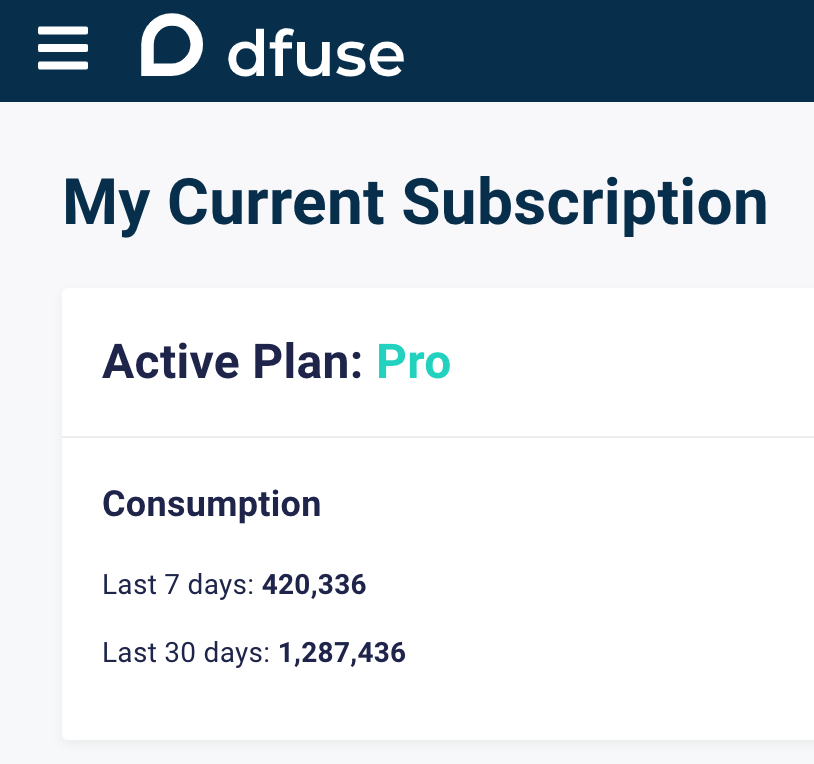Billing & Rate Limiting
Subscription plans
dfuse offers a fast and powerful API to interface with blockchains at an affordable price. Our main website lists the different subscription plans that are offered at the moment.
You can subscribe to one of those plans by creating an account on our self-service portal and visiting the My Current Subscription page. You can start using dfuse immediately after signing up and creating an API key, but you’ll be subject to the acceptable use restrictions of our Free default plan.
For more information regarding this acceptable use policy, we invite you to read the Rate Limiting section below.
What are Documents?
A Document is a response payload returned by the dfuse API.
Each of our subscription plan includes a fixed number of Documents, which we may change over time and are indicated on your invoice when you setup your subscription. You can use the dfuse API for the fixed monthly price of your subscription, but any extra Document above that threshold will have an additional charge.
How can I know how many Documents I have used?
Login to the Self-Service Portal and visit the My Current Subscription page. At the top of the page you will see your Usage consumption for the Last 7 days and Last 30 days.

How are Documents counted for each API?
Authentication endpoint (auth.eosnation.io)
Authentication response payloads are free (i.e. they do not count towards your included number of Documents). Although, this service is subject to Rate Limiting.
REST APIs
When using our REST API, each HTTP response counts as one (1) Document, but it is important to note that in the case of the REST API Search, which may return hundreds of results, each result counts as a Document. For instance, a search query returning 75 results, will be billed as 75 Documents.
WebSocket
Opening a connection does not incur any charge. All of our WebSocket APIs are streaming-oriented meaning that a long running connection will be expected to receive multiple results and each of those will count as a Document.
GraphQL (over WebSocket or gRPC)
Opening a connection does not incur any charge. A GraphQL Query response will either count as one (1) Document or multiple Documents in the case of a list of results (ex. searchTransactionsForward). Similarly, a streaming GraphQL Subscription will be charged as many Documents as you receive response payloads during its lifetime.
Acceptable use limits (Rate Limiting)
In order to guarantee great performance and reliability for all of our users, we reserve the right to throttle certain API requests.
As such, REST APIs may received HTTP Status 429 Too Many Requests(as per `RFC6585` Section 4
along with X-RateLimit-Limit / X-RateLimit-Remaining / X-RateLimit-Reset HTTP response headers. A well-behaved client application should pause for the prescribed amount of time as the request will be dropped and no response will be returned.
Authentication (auth.eosnation.io)
Because we expect well-behaved clients applications to request only one JWT, cache it and use it for up to 24 hours, we do not allow more than a handful of JWTs to be issued per user. At the moment this limit is counted Per IP Address / Per Minute (allowing you to do load balancing), but we reserve the right to adjust this over time.
REST endpoints
- push_transaction, send_transaction: 100/sec, per IP address
- all other: 150/sec, per IP address
Websocket endpoints
At the moment we do not have any rate limiting in place for those endpoints.
GraphQL (WebSocket and gRPC)
At the moment we do not have any rate limiting in place for those endpoints.
